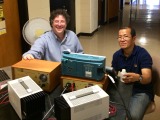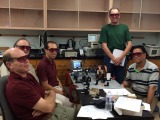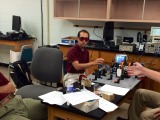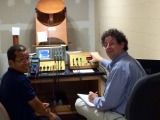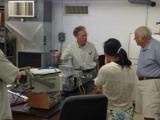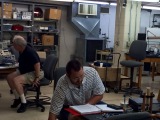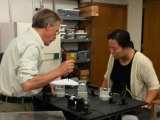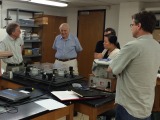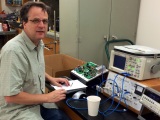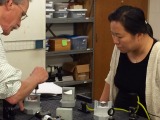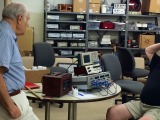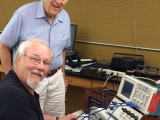The Advanced Laboratory Physics Association, ALPhA, has created a highly successful faculty development program called the “ALPhA Immersions.”
These two to three day immersion experiences bring faculty to a college or university advanced laboratory site where they concentrate on a particular apparatus, learning it well enough to teach it, with confidence, to their own students. These faculty are mentored by another faculty member, who is an expert in this area of experimental physics.
The program was supported by the National Science Foundation, but that support has ended in 2023. The Foundation, through the Synopsys/Reichert endowment will now fund 50% of the cost, with ALPhA contributing 10%, and the charged tuition making up the remainder 40%. There are Immersion sites all over the United States, so that travel costs can be minimized. Additional sites are continually being developed to offer both similar and/or new experiments in a wide range of fields. Both the mentors and the participants have consistently given this program extremely high marks.
For some of the faculty participants, however, one problem does persist. Although these participants are very interested in bringing the Immersion experiment to their home institutions ,the available funding is insufficient. They are looking for help in purchasing the necessary equipment. Well, help is on the way!
At the inaugural meeting of the Foundation Board, September 2014, it was unanimously decided that the first activity of the Foundation would be to provide help with the purchase of the apparatus used in the various Immersions. That is, faculty who complete an Immersion on a given advanced laboratory apparatus, will now have the opportunity to apply for a Foundation grant that will provide up to 50% (one half) of the cost of the hardware used in the experiment, with a maximum grant of $8,000. For the fiscal year 2016, a total of $68,000 in grant money was awarded. For the fiscal year 2017, a total of $49,150 was awarded to 17 different schools. For the fiscal year 2018, a total of $22,515 was awarded to 5 different schools. For fiscal year 2019, a total of $49,741 was given to 10 different schools, for 2020, $9,778 to 3 schools, for 2021, $19,171 to 6 schools, and for 2022, $21,596 was given to 5 schools. All 10 schools that applied in 2023 were awarded grants totaling $42,832 to purchase apparatus studied in their immersions.
The Foundation has provided $319,793 total in its short lifetime, and including the contribution required by the schools, it has added $798,482 worth of new teaching apparatus to excite, challenge and intrigue our next generation of experimental physicists.
Applications
Faculty participants may only submit their application after they have completed the Immersion experience. The last application will be accepted on September 1 of the year of the Immersion. However, one may submit an application for Immersions taken the previous year. You have a little over a year to submit your application. Applicants must include a binding written commitment from the participant’s institution to pay the remainder of the cost of the entire apparatus, if the grant is funded. This commitment includes the promise to purchase the equipment within six months of receiving the grant.
Grant Criteria
The grants will be evaluated by the Foundation using the following criteria (in order of priority):
- Evaluation, by the mentor, of the participant’s work during the Immersion.
- How well this new apparatus fits into the advanced laboratory program of the home school of the participating faculty member.
- The financial needs of the home school.
- Efforts made at the home school to improve their advanced laboratory program.
- Recipients must be an ALPhA Members in good standing.
Grant Restrictions
This program will not fund “short-lived” devices such as computers, data loggers, Arduino’s, data acquisition systems, etc. It will fund physics hardware such as optical components, mechanical devices, vacuum systems, x-ray units, particle detectors, pulsed NMR spectrometers, atomic physics apparatus, plasma physics equipment, specialized electronic instruments like lock-in amplifiers and spectrum analyzers, etc. In short, it will fund apparatus that has a usable long-life in the teaching laboratory. The apparatus may be purchased from any manufacturer that the faculty chooses. It is neither necessary nor advantageous to purchase equipment from TeachSpin, Inc., which is affiliated with the Foundation. These grants are only available to colleges and universities within the United States.
The maximum grant any one school may receive in one academic year is $8,000. The Foundation hopes to raise additional endowment in the coming years, so that it will be able to fund many more grants in the future. Grant funds will go directly to the school after the Foundation has received copies of the invoices for the equipment. It is also acceptable to the Foundation to reimburse the department after it has made the purchase of the apparatus.
